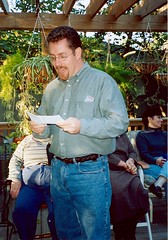Games, Libraries, and Semiotic Domains
I’m always surprised and delighted by serendipitous convergence of ideas ... let me share what I mean ...
- A few weeks ago, our library held a trial video game tourney ...
- I’m currently reading What Video Games Have to Teach Us about Learning and Literacy by James Paul Gee
- On Friday night, I came across Jason’s post on the Cognitive Science blog on Tribe.net about “Life the Game” ...
One of the points I always make is that libraries need to be able to answer questions, inspire new questions, create interaction that builds understanding, and provide opportunities for engagement that changes lives and builds communities. So how does gaming fit into this world of librarydom? Perfectly ...
We know that games (unlike tricks) are not just for kids ... as Mr. Gee says, games are semiotic domains ... they are worlds of meaning that incorporate language, culture, story, and learning. They connect us to our innerselves, to the people around us, and to our history. I didn’t realize it until yesterday, but games are what provided me with an opportunity to know my grandparents ...
When I was a kid, my parents, grandparents, and their friends would spend countless hours around the dinning room table playing pinnocle. Long after I’d gone to bed, I still hear their voices in constant motion. Chatting, arguing politics and ideas, telling stories, cursing their luck ... it was the sound of relationships being built and strengthened ... it was the sound of family ... the sound of community.
As I got older, and began my trek into adulthood, I was allowed to watch them play ... to listen to the language ... to be a part of it without actually interacting. But this was also when I first began to connect with my grandparents. They were people of the Great Depression ... they had worked hard to survive together and had built up a comfortable life that they would never take for granted or even feel secure would be there the next day. They were gracious without gushing and seemed to keep themselves hard around the edges so as to ensure that they’d never forget the hard times. As a little kid they were hard to get to know ... they were harder to want to know. But as we sat there in their dining room, and I heard the stories of family members and friends, as I listened to them rib one another and laugh, and as I grew to understand the meter and rhythm of their interactions, I began to get a sense of them for the first time.
Baseball was the other connection. I grew up in Upstate New York in the days before cable TV spread the games of the Atlanta Braves and the Chicago Cubs to every nook and cranny of America (okay, so now I even sound like my grandfather!). Back then (you know ... in the olden days), we could catch a weekly ballgame on TV, but radio was still the only way to get the daily game. When my grandparents would visit, my grandfather and I would sit in the living room and listen to Phil Rizzuto and Bill White talk about the Yankees. My grandfather would sit there with his Seven-n-7 and a handful of peanuts recounting Yankee players and teams of the past. He’d talk about guys whom I’d never heard of, but who – years later when I had the great fortune of working at the National Baseball Library – I learned about and reshared with him. He was gruff on the outside, and like I said earlier, hard to get to know ... but when we’d talk about baseball he softened and gave me a peek inside at the person he was ... the life he’d led ... the history he’d seen ... it was the game that allowed that ... that was our common semiotic domain ... our shared experience and language and culture ...
Games are important to the future of libraries ... regardless of the venue or medium in which they are played, games enable us to meet new people, to interact with them, and build relationships that lead to community. Games are about stories ... yours ... mine ... and ours. These stories help us learn about and from one another, and they help us form our other circles ... our other semiotic domains.
So ... play on ...

